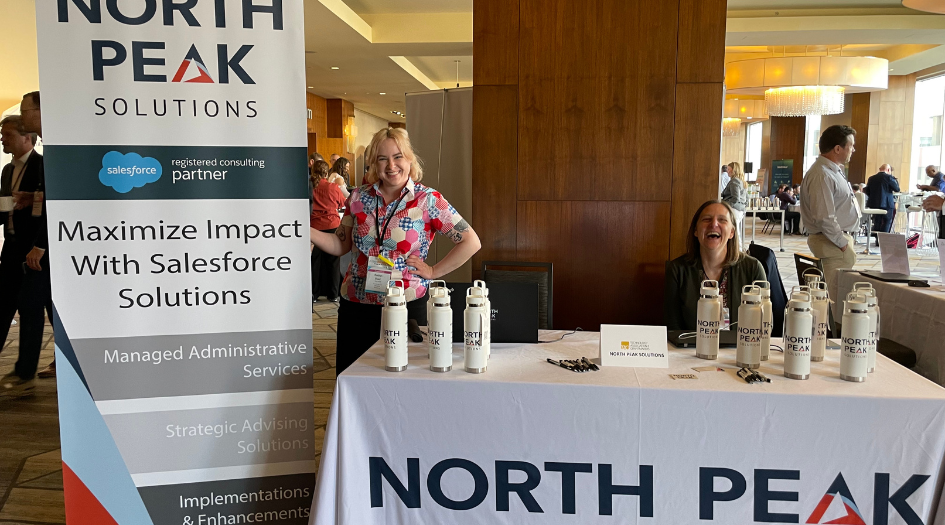
As a consulting firm we’ve completed hundreds of Salesforce implementations, and this experience has shown us that when a client has a dedicated project manager in place, the implementation runs more smoothly and is more likely to be completed on time and within budget. But don’t worry! You probably don’t need to rush to hire a project manager or get your team certified in Project Management. Instead, follow the steps outlined below and you’ll be well on your way to successfully managing your Salesforce Implementation.
Clarify Roles and Responsibilities
Whether you’re working with a nonprofit or a foundation, one of the first actions to take when starting to prepare for a Salesforce implementation is to clarify the roles and responsibilities of all involved. Two important steps you can take to achieve this are:
- Identify all Stakeholders (internal and external) who will be involved with the project.
- Create a RACI chart to identify who is responsible, accountable, consulted, and informed on parts of the project.The chart can be updated as needed, and serves as an important resource to revisit when questions or issues arise.
A Project Manager is Different from a Salesforce Admin
While there may be some overlap in the two roles, a project manager is entirely different from a Salesforce Admin. With that being said, a Salesforce Admin will certainly benefit from some basic project management skills.
- Project managers are in charge of ensuring the project is moving forward in a timely way. This includes keeping track of the budget and scope, regularly communicating updates and needs with internal staff members, and coordinating with the consultant and all external partners.
- Admins are more of a technical role that is involved with reviewing business processes and troubleshooting issues that may arise with the new system.
Ideally the project manager and Salesforce Admin positions are held by different people, which helps ensure each person has the necessary capacity and/or appropriate skill set.
Communicate Regularly to Keep the Project on Track
A project manager needs to coordinate with multiple internal and external stakeholders, so regular communication is key to keeping the project on track.
- Create an internal communications plan that will inform staff of how and when they need to be involved.
- Prioritize regular project updates to all stakeholders.
- Plan ahead so meetings are on the calendar with enough lead time for participants to show up prepared.
It’s also important to keep in mind that consultants are often working on multiple projects at a time, so rescheduling meetings or delaying important decisions can have an outsized impact on the overall timeline. When in doubt remember that you can’t really go wrong with clear and consistent communication.
Understand the Ramifications of Scope Change
Changes to the project scope affect everyone involved and can increase project budget and timelines. Scope change is common, and can be easily managed with (1) a good implementation process that consistently engages users for input such that scope changes surface earlier in the process (note – it’s generally more expensive and disruptive for new features/functions to be added late in the process), (2) consistent communication and (3) documentation of all changes so everyone is on the same page. Good related practices are:
- Assess scope changes for impact on the project goal, budget and timeline.
- Communicate scope changes internally and determine what stakeholders need to be informed of the project change (scope, budget, timeline).
- Maintain a roadmap of items that are either out of scope or will be addressed in the future with additional enhancements to the system. Once the initial implementation is complete, the roadmap of future changes can be handed off to the admin to follow through on.
Risk Management is Key
Risk management is one of the most important elements of successfully managing a project from start to finish, and it connects back to all the other points we’ve made up to now. Potential risks to the project could be related to staffing challenges, staff capacity, or more general organizational timelines, like company retreats or events.
- Identify potential risks early so you can anticipate changes and adjust the project timeline accordingly.
- Communicate as early as possible with the consultant and all other external stakeholders to plan and prepare for events that might affect the project timeline.
Remember- there’s always going to be some sort of breakdown in the project. We’re only human after all! But 9 times out of 10 the breakdown is because risks weren’t communicated early on to the consultant. As a project manager it’s in your best interest to be as prepared as possible!
Keep the Vision Front and Center
Implementations are transformative initiatives that generally take several months to complete. During that time there can be fluctuations in staff enthusiasm or capacity, and regularly revisiting the vision and underlying ‘why’ behind the project can help staff connect the dots between their individual roles and the larger project goals. As a project manager, it’s your role to help keep morale high among your internal team members. This will help people feel engaged and ensure their input is heard and valued, key components of a Change Management strategy, besides being good project management practices.
Next Steps
When it comes to big initiatives like a Salesforce implementation, the project manager is the glue that helps hold the project together. Through regular communication, budget and timeline management, and timely risk assessment, the project manager keeps things moving forward while ensuring that the underlying vision of the initiative continues to serve as a reference point for all involved.
For more thought leadership content related to Salesforce implementations, be sure to check out our resources library. And if you’re considering a move to Salesforce feel free to contact us to learn more about our platform-based approach to Salesforce.
About North Peak
North Peak provides Salesforce-based services for nonprofits, foundations and the affordable housing sector who want to utilize the power of high-functioning CRM and GMS platforms. We achieve this through a holistic set of services, tailored to the needs of our clients.
Blog: Outsourcing Salesforce Administration Services Can Improve Data Management
For some organizations, hiring an outside consultant to handle Salesforce Administration is an important step towards better data management.
Schedule a Free Consultation
If you’re considering implementing Salesforce or need help with Managed Administrative Services, or simply have questions about how to transform your organization’s data practices, we’d love to talk! Contact us for a free 30 minute call.



